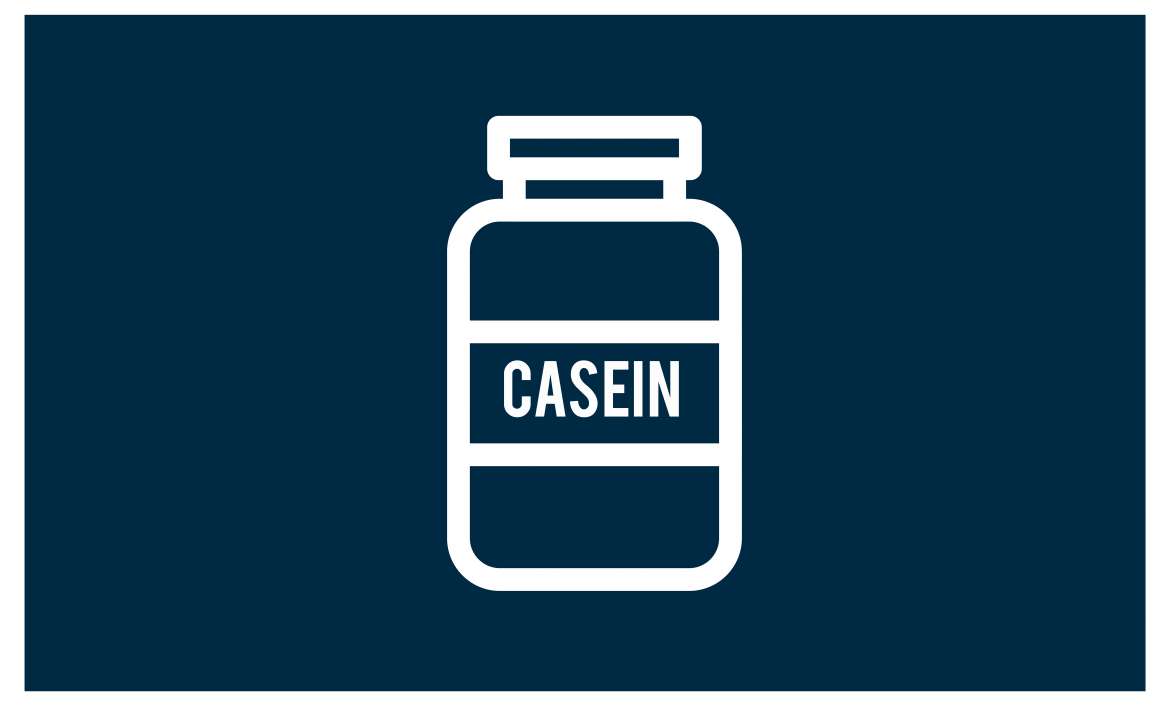Like whey, casein is a milk protein, which can be extracted in the cheese making process. Casein makes up roughly 80% of the protein you can find in cow’s milk and it also has quite a few ingredients that are helpful when wanting to build muscle.
To make casein, you usually add chymosin to whole milk, which causes the milk to coagulate and separates whey from casein. Whereas whey will be found in the liquid part, most of the casein forms a solid mass. This solid mass will then be filtered and purified to concentrate the casein further.
Like all proteins casein is composed of amino acids, the building blocks of tissue and muscle growth. As an animal protein it is also high in all essential amino acids and a fairly good source of the amino acid leucine, which is especially important in muscle growth.
What does casein protein do?
Your body requires more protein when you want to build muscle. Whereas the general recommended protein intake for the average adult should be anywhere from 0.4 to 0.5 grams per pound of bodyweight, someone looking to build muscle at the optimal rate should consume about double that.
While you can theoretically get all your necessary protein from whole food sources, consuming enough protein that way can be tricky, especially when you don’t have time to prepare high protein meals all the time.
That is why most athletes and bodybuilders use protein powders in addition to a balanced diet. So if you are crunched for time, a good protein powder can really make your life easier.
Casein protein qualifies as a good protein powder because of several factors:
Main characteristics of casein protein
Slow Digestibility
Unlike whey, casein is a slow digesting protein. This means it can be taken at any time of day and with any meal, but it is not as helpful if you are looking for a quick source of protein, for example right before your workouts.
Since it’s slower digesting, casein will also keep you full a bit longer than whey protein so it can be used for snacks or before longer fasts when you know you will have nothing to eat for several hours.
Good amino acid profile
Like I said before, casein is high in all the nine essential amino acids, which we need to derive from food and cannot produce in the body. With 2.3 grams of leucine per 25-gram scoop of casein its a bit lower than whey, but still higher than many other protein sources.
Thickening agent
Because of its ability to act as a thickening agent you should use casein instead of whey when making things like mug cakes or other fitness desserts.
Types of casein protein
There are two main types of casein protein products: micellar casein and hydrolyzed casein. Here’s how they are different from each other.
Micellar Casein
Micellar casein is the normal form of casein powder. Unlike hydrolized casein, the molecular structure has been left intact and this encourages slow breakdown and absorption by the body.
Hydrolyzed Casein
Like hydrolyzed whey, hydrolyzed casein has already been broken down into smaller peptides by “hydrolyzing” the bonds.
Just like in the case of whey, hydrolyzed casein is quite a bit more expensive than micellar casein because of all the processing involved. It’s also a lot bitterer than normal casein.
Since the point of casein is to be slow digesting, there aren’t a whole lot of arguments for hydrolyzed casein, which is why I recommend you get the normal version instead. If you need a hydrolyzed protein powder, go with hydrolyzed whey.
How should you take casein protein?
Your daily dose of casein protein, and protein supplements in general, will depend on how much total protein you need to consume per day. Like I mentioned earlier, 0.8 – 1 gram per pound of bodyweight works as a good rule of thumb.
But keep in mind that the majority of your diet should always be based on whole foods, which applies not only to protein but all macronutrients. So try to build your diet around quality protein sources and use protein powder only as a supplement and not as a substitute.
Depending on your lifestyle, required protein intake and willingness to cook I suggest you get around a third to half (maximum!) of your protein from protein shakes.
In regards to casein protein timing, you can take it taken at any time of day and with any meal. If, for some reason, you want to take it before your workout, you probably want to give it more time than whey, so at least an hour or two before you hit the gym.
Casein is also a good protein to take before bed. Consuming any type of protein before bed can help you get a little more recovery and muscle protein synthesis and casein make sure you provide your body with a steady amino acid supply throughout the night.
Side effects
Casein protein is generally very safe. There are no studies showing that protein supplementation or higher protein intake in general can lead to kidney damage or bone loss if you are a healthy adult. People with existing kidney problems should talk to their doctor first, but anyone else shouldn’t worry about whey protein side effects.



